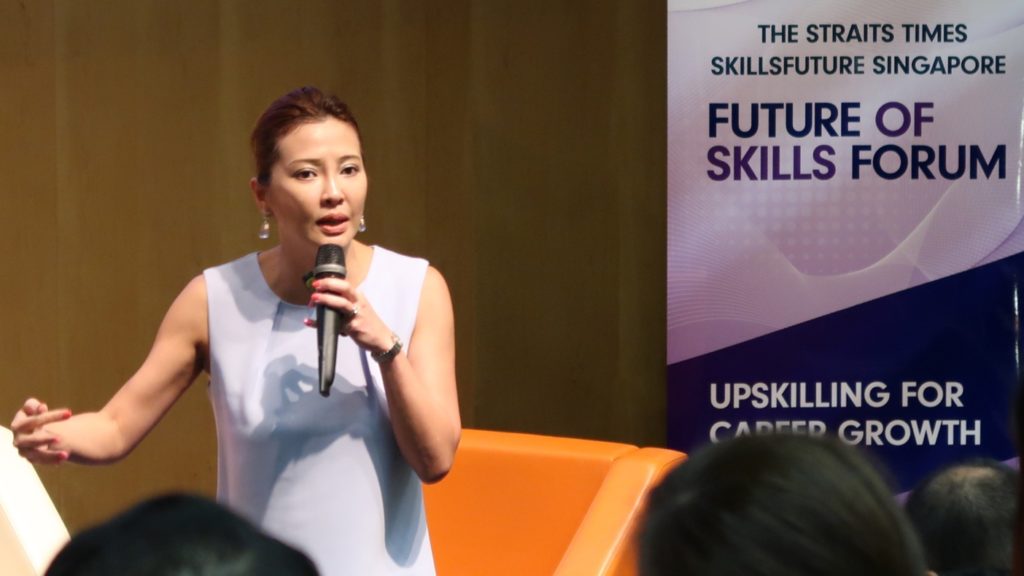LinkedIn’s Talent and Learning Solutions Vice President Feon Ang, who is in her 40s, has been helping companies in Asia Pacific build their workforce, engage and upskill top talent. Outside work, she is a mother of three.
We catch up with her on issues about women at work, changes in job expectations and shifting mindsets.
Women representation at the workplace – how do we compare against the region?
Feon Ang: Our tech industry, in particular, has been rather progressive in addressing diversity. According to LinkedIn’s Economic Graph, there has been an increase in female presence across technical occupations in the last 40 years. There are also more female graduates than male graduates in Singapore, Hong Kong, Philippines, Australia and New Zealand.
The downside however, is that women are less vocal about their achievements. In every market we analysed, women list less skills on their LinkedIn profiles than men. Women are also connecting less; men have on average, more international connections than women. This discrepancy is larger in Singapore than in other parts of the region like Hong Kong and India. It could be interpreted though, that women are evaluating their connection requests quite thoughtfully, choosing quality of quantity.
We are still some way away from achieving gender equality at the workplace, but it is possible to overcome this if business leaders fundamentally transform the way they think about attracting, engaging and hiring top talent. At LinkedIn, we do this by encouraging authenticity, investing in talent among women and under-represented groups, and embedding diversity in the way we recruit.
Any initiative offered within LinkedIn to upskill women and promote inclusivity?
My team and I started the EmpowerIn programme at LinkedIn to provide better support to my fellow female colleagues across Asia Pacific. I wanted to help them become stronger leaders and empower them to have a strong voice. The eight-month development programme includes workshops to learn how to lead with data and insights, as well as virtual learning lessons and group mentoring to support their transformation.
Are worries about implementing flexible work arrangements undue?
Increasingly, we are seeing that success is not defined by six-figure salaries and promotions. At the end of the day, health, happiness and a good work-life balance are the most important measures of success for Singaporeans. Together with the rise of independent work and the gig economy, there is definitely a higher proportion of the workforce who opt for or have the desire for flexible work arrangements.
Thus, companies should start embracing this trend or lose out on a significant proportion of the workforce, especially the younger professionals. Ultimately, companies need to think about how the workplace is enabling talent to get closer to achieving their own definition of success. This will help them retain their best talent.
What are the latest workplace trends?
Artificial intelligence (AI) and automation, skills gap, and the rise of independent work are the three big trends disrupting industries today.

The total number of unemployed individuals in Singapore stood at around 71,600 as of September 2017, yet there are still about 27,000 open jobs on LinkedIn. To stay relevant in the workforce of the future, a good starting point would be to assess current skillsets and determine how those skills fit into the demands of today’s businesses – if at all. The future of work for humans will focus on things that machines cannot do, so soft skills such as empathy and relationship building will always be in demand.
It is heartening to see that the Singapore Government has been promoting various skills and life-long learning initiatives and programmes, but it takes two to tango. Businesses have to play their part by equipping themselves with a deeper understanding of the market landscape of talent.
Talk to us about the rise of independent work.
Today’s youth are more inclined to take up project-based roles, which give them greater options and flexibility to choose ‘gigs’ that they are more passionate about. The proliferation of online marketplaces, together with the increased supply of co-working spaces have laid out the necessary services and infrastructure for the gig economy to flourish. All that’s left is a shift in purpose and mindset, which is already happening.
Any tips on overcoming industry disruptions?
Every professional is driven by his or her own motivations, goals and inspiration. Success means different things to different people, and the truth is, we’re all at different points on our journey.
Success is no longer pegged to professional achievements but instead to having enough quality time outside of work with the people you love, or to feeling a sense of belonging in communities.
As professionals discover what they are in it for, they will realise that upskilling and training alone do not guarantee success. The value of personal branding and networking has and will become more important for professionals to discover opportunity, and in turn, be discovered.

